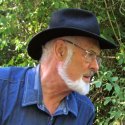The most famous UK small school was The Small School in Hartland, Devon.
Our own Philip Toogood and his wife Annabel were involved. They were invited by the Schumacher Society to co-ordinate a movement to become known as the Human Scale Education Association in 1985, culminating in a three-day international conference in Oxford. This explored the ideas of Minischooling and Flexischooling in a variety of settings including the ‘New York City as School’ and the need to protect small schools and the right to home education. The three main planks of Human Scale Education were:
Small Schools – both the preservation of those in existence as well the development of new ones,
Mini-schooling to humanise large schools,
Flexischooling to link the human scale structures of schools with home-educating families in genuine home-school partnerships.
Philip and his wife Annabel spent two years working at the Small School at Hartland. They were then asked by parents to re-open the Dame Catherine’s School at Ticknall, Derbyshire, as an independent, parent-cooperative learning centre and all-ages school and base for the development of flexischooling.
The Small School Wikipedia page.
Sadly, after 35 years (founded 1982) The Small School is closing at the end of 2016-2017 school year.
Small Schools.
Education Now Special Report
Philip Toogood (1991) (Ed)
Education Now Publishing Cooperative Limited, Ticknall, Derbyshire. ISBN 1 – 871526 06 1.
Philip Toogood edited this volume with chapters from James Hemming, John Anderson, Neil Tramner, David Keast, Hussein Lucas, John Davis and Roland Meighan.
Philip’s intentions were clear in his introductory essay ‘The Big is the Enemy of the Best.’
It is time to recognise that human beings live in small groups which exist side by side with other small groups and which together make up large groups. Time, too, to recognise that at the heart of the small group is the individual and that is the quality of the individual’s living which matters most of all in the quality of a society’s existence. Pguy, an early French socialist, was right when he asserted that he had no faith in humankind, but every confidence in the individual people who compose the species.’
… I learned from all my jobs that it is possible to teach effective learning by making a situation where I could (with my students) have effective power over the five main variables which it was necessary to manage in any teaching situation. These all begin with ‘T’… Time, Territory, Things, Teachers and Thinking (or planning and evaluation procedures). Where these can be precisely resolved, and managed by the teacher-learner grouping there is the best chance of developing that environment for learning which produces commitment and enthusiasm by both learner and teacher. Only in the small school environment or where these small schools are acting as minischools on a single campus can this really be achieved.
However, Philip was not blinkered.
… Smallness does not in itself guarantee democratic practice and creative learning. In fact, when you get autocratic practice in a small institution you can have the worst of all worlds because there is no escape for the victim, the student! At this point the inefficiency and crass stupidity of the mass system seems like heaven!
Ultimately, he believed in the efficacy of the smallness principle
In our country it is not small schools which are expensive, but large ones since they cannot achieve, in their monolithic form, what many small schools working in clusters can manifestly do. We have lost a generation of our young people into a state of alienation from education by putting them through these vast inappropriate learning factories.



